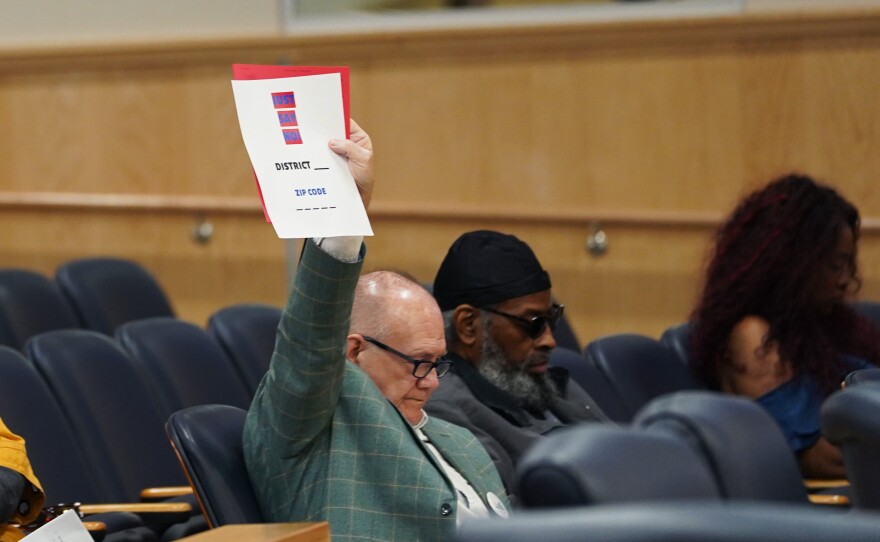Thirty-eight Virginia Beach residents spoke at a comment session Tuesday night on adding a referendum to November’s ballot. Most speakers opposed it.
The referendum would ask which voting system residents want in the city charter: the current with 10 district elections for the city council and one at-large for mayor, or a version of an older system with seven seats for council districts, and the mayor and three additional seats elected at-large.
Thirty-one speakers supported the 10-1 system, which was used in 2022 and 2024. A referendum, they said, resurrects a debate that should have been put to rest years ago.
“Why, when the courts have ruled, the citizens have spoken,” Jane Bloodworth Rowe said, “why are we even revisiting this issue?
“I thought it was over.”
Before 2022, the city used a version of the 7-3-1 system in which each council member and the mayor were elected by the city. A 2017 lawsuit alleged the system violated the Voting Rights Act by diluting the voting strength of Black, Asian and Hispanic residents.

In 2021, a federal court ruled in favor of the plaintiffs and ordered Virginia Beach to change the election to the 10-1 system.
Supporters say the new system gives them a direct line to their district representatives. They also tout the more racially diverse city council it yielded in 2022, when three Black council members were elected. A 2023 survey said 81% of residents preferred the 10-1 system.
However, the 10-1 change never made it into the city charter. Gov. Glenn Youngkin vetoed an amendment to change the charter last year, citing continuing court cases. A similar bill failed in the senate this year.
A 2024 lawsuit alleged the 2022 election was invalid because it followed a system not in the city’s charter. The court upheld the 2022 election results and denied an injunction to prevent the 2024 election. Another trial related to the suit is pending this year.
Seven speakers were in favor of a referendum. Four said they supported 7-3-1, and three were neutral on the outcome but wanted the vote.
“Let’s put it to a vote and get on with it,” said Phil Hines. “I think some people think the 7-3-1 is going back to what we used to have. What we’re looking at is a hybrid, balanced approach.”
Hines ran for city council in 2024.
Supporters of 7-3-1 say a modified system that complies with recent changes to state voting law would allow for racially representative elections.
Speakers on both sides of the issue, though, said the wording of the referendum is confusing. It asks 10-1 supporters if they are in favor of a change to the city charter; it implies, they said, the 10-1 system is not in place.

Councilmember Jennifer Rouse supports 10-1 and opposes a referendum.
“We know 10-1 has a legal pathway; 7-3-1 is more unclear,” she said in an interview after the public comments. If a referendum vote shows a preference for 7-3-1, “my concern is that we may not be able to do that and this has been a wasted exercise.”
The General Assembly is not required to follow the people’s vote. A.J. Nolte, a professor of politics at Regent University, thinks representatives in Richmond would likely recognize a referendum, though.
“I think the General Assembly, at least the representation down here, would want to take that outcome a little bit more seriously,” he said, noting senators and delegates are also up for reelection.
Voting systems have historically been put in place — and changed — to influence the outcome of elections, Nolte said. But short-term changes “almost always” have unintended consequences in the long run.
“The best way to get the voting outcome that you want is to make sure that your people actually turn out and vote, regardless of the system that you have,” he said.
City council will vote May 6.



